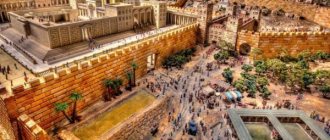Salvation of the soul. There is hope for everyone!
Who is man in the eyes of God?
The most important idea of the Gospel, “Good News,” is that God loves man infinitely. Not only humanity in general, as “the work of our own hands,” but also each person in particular. Every dear and unique human personality.
Man was created by God as the crown of creation, having in his nature both a part of the spiritual, invisible world, and a part of the visible, material world. Therefore, if a person praises God, it turns out that in his person the entire world created by God immediately gives praise to its Creator.
Before the coming of the Savior, people perceived God as the Creator of the world, the Judge, the Master. But the Lord Jesus Christ brought them an absolutely amazing and unusual idea that people are infinitely dear and beloved children to God. Sons and daughters. The idea that they were created in order to share with God the joy of eternal life. That life was given to them to become like God. That the sinless Lord is ready to go even to torture and death in order to reconcile the children who have fallen away from him with the Father.
The parable of the lost sheep told by the Savior contains the greatest hope of every person - the Lord is ready for him personally to leave all the righteous and in any situation to give him a hand so that it is his soul that avoids destruction.
Is there any hope of salvation for harlots, sorcerers, murderers and apostates?
A person who has turned to God and realized his former sinful life is often on the verge of despair. He cautiously asks the priest if there is any hope of salvation in his situation. In a situation where he personally would have doomed such a scoundrel as he suddenly realized himself to be to eternal torment. When abortion, sexual perversion, betrayal, murder, perjury, condemnation of everyone and everything, negligence, extortion and the like are left behind.
And the priest answers him that everyone has hope of salvation. He gives him as an example the lives of saints who were once inveterate sinners, but repented, changed their lives, and not only received forgiveness, but also achieved deification. Let us consider some such examples.
Venerable Mary of Egypt, former harlot
Mary of Egypt was born in the capital of ancient learning - Alexandria of Egypt in the middle of the 5th century. At the age of 12 she left home and quickly became involved in a vicious life.
For more than 17 years she indulged in fornication. By her own admission, she liked the vice so much that she did not even take money from those who had intimate relations with her. One day she went on a ship with pilgrims to Jerusalem. Sailing with the pilgrims on the ship, Mary did not stop seducing them and sinning.
However, in the Holy Land, a metamorphosis occurred with her soul. She tried to go to the Church of the Resurrection of Christ and some force did not let her in. Then the realization of all the baseness of her previous life came to her mind and Maria deeply repented for her past sins.
After this, she was able to enter the temple, where she prayed for a long time and abundantly mourned her life. After some time, Mary was baptized, received communion of the Holy Mysteries of Christ, and went into the Egyptian desert to overcome the passions that had sprouted in her soul.
She cried out to God for help for many years. For 17 whole years, the same amount of time that vices had previously occupied in her life, Mary drove away obsessive thoughts about prodigal sin, endured hunger, the heat of the day and the cold of the night. Finally, for persistent repentance and prayer, the Lord rewarded Mary with dispassion and grace.
When her life writer, Elder Zosima, met Mary in the desert, she was already a completely holy woman, pious and chaste. At the end of her life, during prayer, she even rose slightly above the ground and performed other miracles that often accompany a holy life.
Hieromartyr Cyprian of Antioch, former sorcerer
Living in the 3rd century AD, Cyprian was dedicated from childhood by his pagan parents to the service of Apollo. He underwent priestly training from many famous sorcerers and sorcerers, so that already in his youth he became a famous sorcerer.
By the age of 30, he had completed his training in magic and had become so skilled in witchcraft that he spoke face to face with the devil himself. Living in Antioch, he seduced many people to all sorts of iniquities, destroyed many with poison and sorcery, and sacrificed young men and maidens to demons.
One day he undertook to seduce the pious Christian virgin Justina for the wicked young man Aglaid for a fee. But none of his spells worked with her, and all the demon servants and even the devil himself could not do anything with the righteous woman.
Then Cyprian realized the weakness of the demons before the true God and turned to Christ. He came to the temple and publicly repented of his previous sins, refusing to leave the holy place until he became a Christian.
Seeing his persistence, the bishop performed the Sacrament of Baptism on Cyprian. After some time, growing in repentance, prayers and spiritual deeds, Cyprian was ordained as a reader. He was then ordained a deacon, a priest, and finally a bishop.
During the next persecution of Christians, Bishop Cyprian was captured and, together with the pious Justina and other Christians, sentenced to torture and death. After torture, the holy martyr Cyprian was beheaded with a sword. Later, healings and other miracles began to occur at the saint’s grave.
Reverend Moses Murin, former robber
Ethiopian Moses lived in the 4th century. For several years he was the leader of a well-known gang of robbers and, with his cruelty, terrified all the inhabitants of the area in which he lived.
By the great mercy of God, Moses repented of his crimes, left a gang of robbers and went to one of the desert monasteries, where for years he exhausted his flesh with intense fasting and prayed unceasingly in order to overcome his anger and lustful passion.
After spending many years in monastic endeavors, the Monk Moses achieved dispassion, and over time was ordained a deacon, then a presbyter, in whose rank he labored for another 15 years and gathered 75 disciples around him.
When the saint turned 75 years old, robbers attacked the monastery where the ascetic and his disciples lived and killed him and six other monks. Shortly before the attack, the monk predicted a future event for the brethren and most of the monks were saved, leaving in time for another monastery.
Hieromartyr Marcellinus, Pope, former apostate
Saint Marcellinus was pope at the height of the persecution of Christians under Diocletian and Maximian at the end of the 3rd century.
Frightened by the cruel torment, in which up to 17,000 Christians were tortured within a month, the captured pope renounced Christ, burned incense and made a sacrifice to idols. The emperor called him his friend and dressed him in luxurious clothes. And Pope Markellin wept bitterly that, having encouraged many to accept torment for Christ, he himself set an example of cowardice for his flock and repented of what he had done.
At that time, a Council of 180 bishops and presbyters was meeting in the city of Sinuessa. Pope Marcellinus appeared at the meeting of the Council in a hair shirt, sprinkled ashes on his head and asked to be judged for his renunciation, saying: “I recognize myself as deprived of the priesthood, of which I am unworthy. Let my body not be buried after death, but thrown to be devoured by dogs; may he be cursed who dares to bury him.”
After this, the Roman pontiff came to the emperor and, in front of everyone, confessed Christ as God and declared repentance for his previous renunciation. The enraged emperor executed Marcellinus and ordered his corpse to be thrown along the road.
For about a month, the body of the Pope lay in plain sight, somewhere on the side of the road. Finally, in a dream vision, the Apostle Peter himself appeared to the new pope and ordered the body of the repentant martyr Marcellinus to be buried with all the honors due to a Christian saint.
What difficulties does a person encounter in the Church when embarking on the path of repentance?
Unfortunately, the path of a repentant sinner is by no means easy. Not only is he tormented by moral suffering from the realization of his own sins. He also experiences difficulty in overcoming the passionate tendencies that he has long indulged.
We all know that it is many times easier for a person not to use drugs when he has never tried them than when his entire body has become dependent on these harmful chemicals. Absolutely the same can be said about all types of sinful inclinations that exist.
It is difficult for a repentant person to struggle with his passions and he can defeat them within his soul only by relying on the gracious help of the Lord himself.
The second of the serious problems of repentance is human memory. A person may already realize everything and change internally, but the inertia of the thinking of others often prevents his repentance. Without separating sin from the sinner, many of his brothers and sisters in Christ continue to consider such a person fallen and shun, and sometimes directly remind him of his previous sins. Not rejected by Christ, he is rejected by his children.
Unfortunately, such a meeting in the Church often forces a person to leave there and, sometimes, even fall again into that abyss of passions from which he had such difficulty getting out.
The Gospel story about the Savior's walk on the waters is an allegory for man's achievement of holiness. Without fear, only the sinless Lord himself, or one who is fueled by the power bestowed by the Lord and has firm trust in Him, can walk above the sea of everyday passions. But anyone who doubts or is proud of himself quite easily plunges headlong into the abyss of passions. Then the person is horrified, repents and shouts: “Save me, I’m perishing!”
The duty of every Christian in this case is not to drown him even deeper, but to become like Christ and extend a helping hand to him, despite the cowardice he has previously shown, because anyone can find himself in his place.
Every person living on Earth has hope for eternal life. With God's help, everyone can be saved. Many saints had their own past, but every sinner can have their own future!
Andrey Szegeda
You can applaud the author (at least 10 times)54
How categorically did God set out the conditions of salvation?
Quite categorically:
- Salvation does not imply faith in general, but faith in Christ: “He who believes in Him is not condemned, but he who does not believe is already condemned...” (John 3:18).
- Faith implies belonging to the United Orthodox Church: “and if he does not listen to the Church, then let him be to you as a pagan and a tax collector” (Matthew 18:17). Whoever believes and is baptized will be saved; but whoever does not believe will be condemned” (Mark 16:16).
- Faith must be apostolic: “But even if we or an angel from heaven preach to you a gospel other than what we preached to you, let him be accursed” (Gal. 1:8-9).
- Faith must be accompanied by corresponding works: “faith without works is dead” (James 2:20).
How interconnected and free are people in salvation?
It is obvious that a child raised in a dysfunctional family, for example, in a family of drug addicts or simply atheists, initially has fewer opportunities to know God than a child from a relatively prosperous Christian family. People influence each other, for example, we see numerous examples in the world around us when one person kills or maims another. Nevertheless, everyone can achieve salvation, because God has given each of us an internal guide—conscience—and calls every person to His Church. “...And from everyone to whom much is given, much will be required; and to whom much is entrusted, they will require more from him” (Luke 2:48).
Christianity
At birth, a person receives human life from God and from his earthly parents. According to the teachings of the church, this is a temporary and imperfect life, and eternal, perfect, incorruptible life (divine life) is given to a person only upon “being born again” (John 3:3-8), that is, for this one must be born of God, become His child, through faith in Jesus Christ the Son of God and His atoning sacrifice.
At the end of time, all people will be resurrected, judged by God (Rom. 14:10-12), they will receive their reward or punishment according to their lives. All who accept Christ will be glorified and become the corporate expression of the Triune God on the new earth. For believers and those who love God, this life will be so blessed that even those who have received the Spirit from God cannot yet imagine it, “But, as it is written: eye has not seen, ear has not heard, and what God has prepared has not entered into the heart of man.” those who love Him. But God revealed this to us by His Spirit; for the Spirit searches all things, even the deep things of God. For which man knows what is in a man except the spirit of man that dwells in him? Likewise, no one knows the things of God except the Spirit of God. But we have not received the spirit of this world, but the Spirit who is from God, so that we might know the things freely given to us from God, which we proclaim not in words taught by human wisdom, but in words taught by the Holy Spirit, comparing spiritual with spiritual” (1 Cor. 2:9-13) .
Those who do not believe and are wicked will not receive the gift of eternal life, they will be damned for eternity “for the wages of sin is death, but the gift of God is eternal life” (Rom. 6:23). Instead of eternal life, eternal punishment is prepared for them: “eternal destruction” (2 Thess. 1:9), “another death” (Rev. 20:15), or “eternal fire” (Matthew 25:41), “unquenchable fire” (Mark 9:43, 45) together with the devil and his angels (Matthew 25:41). This punishment and torment will never end for them, it will be eternal.










